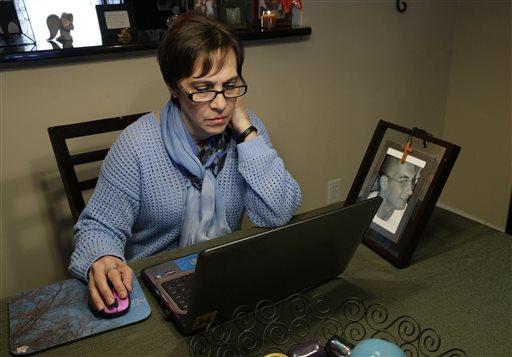Section Branding
Header Content
Group Adds Georgia To Addiction Resource List, Helpline
Primary Content
A nonprofit is hoping to help end the opioid epidemic in Georgia by providing better resources for those struggling with substance use disorder.
The Addiction Policy Forum vets treatment facilities and providers before adding them to its database, Danielle Tarino said.Danielle Turino with Addiction Policy Forum explains a resource for Georgians struggling with their or their loved ones' substance use disorder. GPB's Ellen Eldridge reports.
"We believe a team of experts here could be the thing that starts to fill the gap and close the wide gap that we have in healthcare around why people can't get treatment the day that they need it," Tarino said.
President and CEO Jessica Hulsey Nickel started the organization from her kitchen counter in 2015, after many years working in addiction policy. Both of Nickel's parents died of complication from their heroin use disorder, so the mission is personal, Tarino said.
The idea is to create an easy-to-navigate website for those struggling with addiction and their loved ones. Resources for Georgia were most recently added, but all 50 states will have available information by the end of the year.
"It's for moms and dads in the middle of the night that have no place else to turn and have called 20 places and keep getting turned down because they don't know the right information about their loved ones' situation in order to get them in there for an assessment or for all the treatment," Tarino said.
RELATED:
- Georgia Lawmaker Wants To Empower Pharmacists In The Fight Against Opioid Abuse
- Realtors Use Commissions To Fight Opioid Epidemic
- Health Experts Champion Pastor's Idea For Needle Exchange In Canton
Patty DiRenzo is a mother and a cancer survivor who believes she is winning her fight because her disease doesn't have the same stigma as her son's.
"Sal lost his battle with addiction, even after desperately seeking treatment," DiRenzo shared online. "For years, my daughter and I tried to help get Sal into drug treatment – treatment that he wanted but couldn’t afford or access."
They were turned away from several hospitals and rehab facilities, before her son was able to sign himself into care.
"Just 11 days into his program, Sal was involuntarily released because funding had run out," DiRenzo said. "He overdosed in September, shortly thereafter."
The DiRenzo family story is one shared in Georgia as it is across the nation, but the Addiction Resource Center does not list every provider. They strive to partner people with resources that will help those in need.
"We also call pretty much every single center to verify information to make sure that what we have is correct; to make sure that they haven't moved or changed phone numbers are no longer prescribing those medications," Tarino said. "We've called doctors' offices off the national buprenorphine list and find out they are no longer in practice."
People can also call a helpline to connect with treatment resources in their Georgia county.


